上外英语语言文学专业翻译考题
- 格式:doc
- 大小:43.00 KB
- 文档页数:4
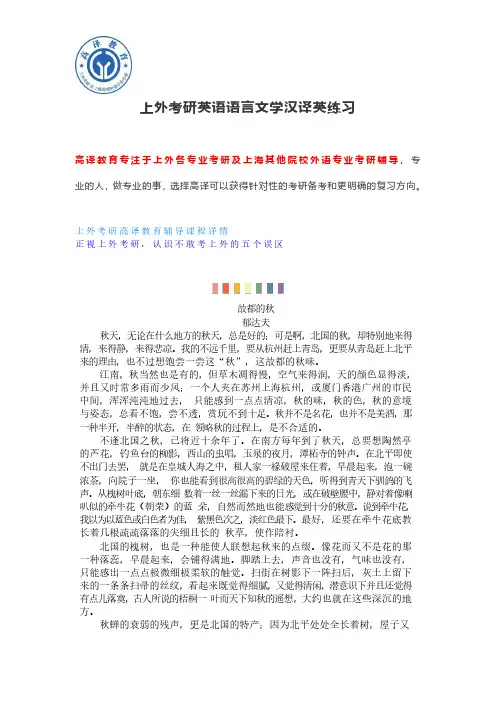
上外考研英语语言文学汉译英练习高译教育专注于上外各专业考研及上海其他院校外语专业考研辅导,专业的人,做专业的事,选择高译可以获得针对性的考研备考和更明确的复习方向。
上外考研高译教育辅导课程详情正视上外考研,认识不敢考上外的五个误区故都的秋郁达夫秋天,无论在什么地方的秋天,总是好的;可是啊,北国的秋,却特别地来得清,来得静,来得悲凉。
我的不远千里,要从杭州赶上青岛,更要从青岛赶上北平来的理由,也不过想饱尝一尝这“秋”,这故都的秋味。
江南,秋当然也是有的,但草木凋得慢,空气来得润,天的颜色显得淡,并且又时常多雨而少风;一个人夹在苏州上海杭州,或厦门香港广州的市民中间,浑浑沌沌地过去,只能感到一点点清凉,秋的味,秋的色,秋的意境与姿态,总看不饱,尝不透,赏玩不到十足。
秋并不是名花,也并不是美酒,那一种半开,半醉的状态,在领略秋的过程上,是不合适的。
不逢北国之秋,已将近十余年了。
在南方每年到了秋天,总要想陶然亭的芦花,钓鱼台的柳影,西山的虫唱,玉泉的夜月,潭柘寺的钟声。
在北平即使不出门去罢,就是在皇城人海之中,租人家一椽破屋来住着,早晨起来,泡一碗浓茶,向院子一坐,你也能看到很高很高的碧绿的天色,听得到青天下驯鸽的飞声。
从槐树叶底,朝东细数着一丝一丝漏下来的日光,或在破壁腰中,静对着像喇叭似的牵牛花(朝荣)的蓝朵,自然而然地也能感觉到十分的秋意。
说到牵牛花,我以为以蓝色或白色者为佳,紫黑色次之,淡红色最下。
最好,还要在牵牛花底教长着几根疏疏落落的尖细且长的秋草,使作陪衬。
北国的槐树,也是一种能使人联想起秋来的点缀。
像花而又不是花的那一种落蕊,早晨起来,会铺得满地。
脚踏上去,声音也没有,气味也没有,只能感出一点点极微细极柔软的触觉。
扫街在树影下一阵扫后,灰土上留下来的一条条扫帚的丝纹,看起来既觉得细腻,又觉得清闲,潜意识下并且还觉得有点儿落寞,古人所说的梧桐一叶而天下知秋的遥想,大约也就在这些深沉的地方。
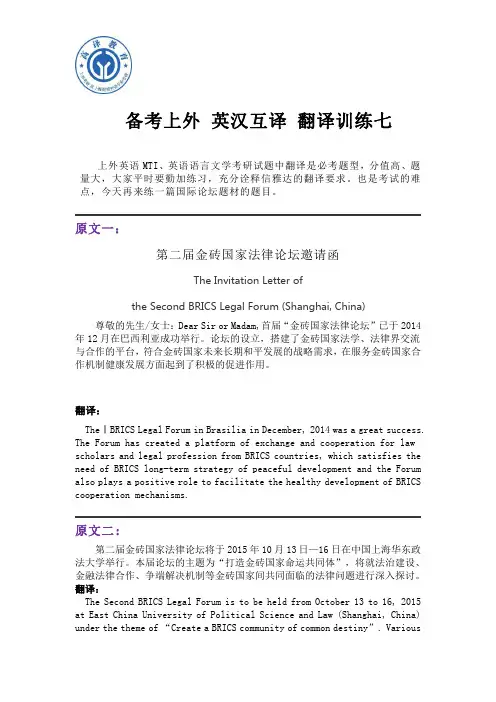
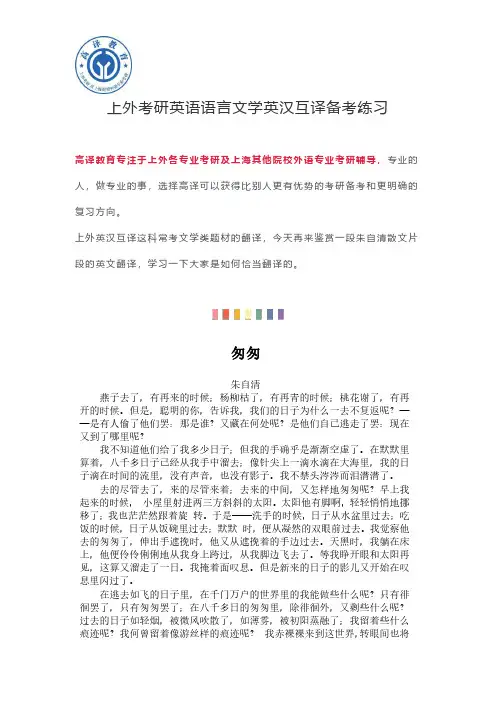
上外考研英语语言文学英汉互译备考练习高译教育专注于上外各专业考研及上海其他院校外语专业考研辅导,专业的人,做专业的事,选择高译可以获得比别人更有优势的考研备考和更明确的复习方向。
上外英汉互译这科常考文学类题材的翻译,今天再来鉴赏一段朱自清散文片段的英文翻译,学习一下大家是如何恰当翻译的。
匆匆朱自清燕子去了,有再来的时候;杨柳枯了,有再青的时候;桃花谢了,有再开的时候。
但是,聪明的你,告诉我,我们的日子为什么一去不复返呢?——是有人偷了他们罢:那是谁?又藏在何处呢?是他们自己逃走了罢:现在又到了哪里呢?我不知道他们给了我多少日子;但我的手确乎是渐渐空虚了。
在默默里算着,八千多日子已经从我手中溜去;像针尖上一滴水滴在大海里,我的日子滴在时间的流里,没有声音,也没有影子。
我不禁头涔涔而泪潸潸了。
去的尽管去了,来的尽管来着;去来的中间,又怎样地匆匆呢?早上我起来的时候,小屋里射进两三方斜斜的太阳。
太阳他有脚啊,轻轻悄悄地挪移了;我也茫茫然跟着旋转。
于是——洗手的时候,日子从水盆里过去;吃饭的时候,日子从饭碗里过去;默默时,便从凝然的双眼前过去。
我觉察他去的匆匆了,伸出手遮挽时,他又从遮挽着的手边过去。
天黑时,我躺在床上,他便伶伶俐俐地从我身上跨过,从我脚边飞去了。
等我睁开眼和太阳再见,这算又溜走了一日。
我掩着面叹息。
但是新来的日子的影儿又开始在叹息里闪过了。
在逃去如飞的日子里,在千门万户的世界里的我能做些什么呢?只有徘徊罢了,只有匆匆罢了;在八千多日的匆匆里,除徘徊外,又剩些什么呢?过去的日子如轻烟,被微风吹散了,如薄雾,被初阳蒸融了;我留着些什么痕迹呢?我何曾留着像游丝样的痕迹呢?我赤裸裸来到这世界,转眼间也将赤裸裸地回去罢?但不能平的,为什么偏要白白走这一遭啊?你聪明的,告诉我,我们的日子为什么一去不复返呢?Transient Days(张培基版)If swallows go away,they will come back again.If willows wither,they will turn green again.If peach blossoms fade,they will flower again.But,tell me,you the wise,why should our days go by never to return?Perhaps they have been stolen by someone.But who could it be and where could he hide them?Perhaps they have just run away by themselves.But where could they be at the present moment?I don't know how many days I am entitled to altogether,but my quota of them is undoubtedly wearing away.Counting up silently,I find that more than 8,000days have already slipped away through my fingers.Like a drop of water falling off a needle point into the ocean,my days are quietly dripping into the stream of time without leaving a trace.At the thought of this,sweat oozes from my forehead and tears trickle down my cheeks.What is gone is gone,what is to come keeps coming.How swift is the transition in between!When I get up in the morning,the slanting sun casts two or three squarish patches of light into my small room.The sun has feet too,edging away softly and stealthily.And,without knowing it,I am already caught in its revolution.Thus the day flows away through the sink when I wash my hands; vanishes in the rice bowl when I have my meal;passes away quietly before the fixed gaze of my eyes when I am lost in reverie.Aware of its fleeting presence,I reach out for it only to find it brushing past my out-stretched hands.In the evening, when I lie on my bed,it nimbly strides over my body and flits past my feet.By the time when I open my eyes to meet the sun again,another day is already gone.I heave a sign,my head buried in my hands.But,in the midst of my sighs,a new day is flashing past.Living in this world with its fleeting days and teeming millions,what can I do but waver and wander and live a transient life?What have I been doing during the 8,000fleeting days except wavering and wandering?The bygone days,like wisps of smoke,have been dispersed by gentle winds,and,like thin mists,have been evaporated by the rising sun.What traces have I left behind?No,nothing,not even gossamer-like traces.I have come to this world stark naked,and in the twinkling of an eye,I am to go to back as stark naked as ever.However,I am taking it very much to heart:why should I be made to pass through this world for nothing at all?O you the wise,would you tell me please:why should our days go by never to return?Rush(朱纯深版)Swallows may have gone,but there is a time ofreturn;willow trees may have died back,but there isa time of regreening;peach blossoms may havefallen,but they will bloom again.Now,yo u the wise,tell me,why should our days leave us, never toreturn?-If they had been stolen by som eone,whocould it be?Where could he hide them?If they had made the escape themselves,then wherecould they stay at the moment?I don't know how many days I have been given to spend,but I do feel my hands are gettinge mpty.Taking stock silently,I find that more than eight thousand days have already slid awayfrom me.Like a drop of water from the point of a needle disappearing into the ocean,my daysare drip ping into the stream of time, soundless,traceless.Already sweat is starting on myforehead,and te ars welling up in my eyes.Those that have gone have gone for good,those to come keep coming;yet in between,hows wift is the shift,in such a rush?When I get up in the morning,the slanting sun marks itspresence in my small room in two or three oblongs.The sun has feet,look,he is treading on,lightly and fu rtively;and I am caught,blankly,in his revolution.Thus--the day flows awaythrough the sink wh en I wash my hands, wears off in the bowl when I eat my meal,andpasses away before my day-dr eaming gaze as reflect in silence.I can feel his haste now,so Ireach out my hands to hold him bac k,but he keeps flowing past my withholding hands.In theevening, as I lie in bed,he strides over my body,glides past my feet,in his agile way. Themoment I open my eyes and meet the sun agai n,one whole day has gone.I bury my face inmy hands and heave a sigh.But the new day begins t o flash past in the sigh.What can I do,in this bustling world,with my days flying in their escape? Nothing but tohes itate,to rush.What have I been doing in that eight-thousand-day rush,apart fromhesitating?Thos e bygone days have been dispersed as smoke by a light wind,or evaporatedas mist by the mornin g sun. What traces have I left behind me?Have I ever left behind anygossamer traces at all?I hav e come to the world,stark naked;am I to go back,in a blink,inthe same stark nakedness?It is not fair though:why should I have made such a trip fornothing!You the wise,tell me,why should our days leave us,never to return?专注上外考研辅导高译教育-由上外及北外硕博校友创办,专注上外各个专业考研、考博及上海院校外语专业考研、考博辅导。
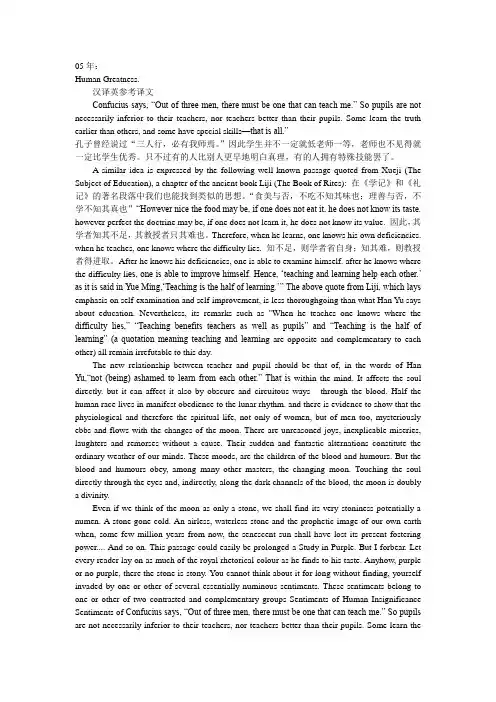
05年:Human Greatness.汉译英参考译文Confucius says, “Out of three men, there must be one that can teach me.” So pupils are not necessarily inferior to their teachers, nor teachers better than their pupils. Some learn the truth earlier than others, and some have special skills—that is all.”孔子曾经说过“三人行,必有我师焉。
”因此学生并不一定就低老师一等,老师也不见得就一定比学生优秀。
只不过有的人比别人更早地明白真理,有的人拥有特殊技能罢了。
A similar idea is expressed by the following well-known passage quoted from Xueji (The Subject of Education), a chapter of the ancient book Liji (The Book of Rites): 在《学记》和《礼记》的著名段落中我们也能找到类似的思想。
“食美与否,不吃不知其味也;理善与否,不学不知其真也”“However nice the food may be, if one does not eat it, he does not know its taste. however perfect the doctrine may be, if one does not learn it, he does not know its value. 因此,其学者知其不足,其教授者只其难也。
Therefore, when he learns, one knows his own deficiencies. when he teaches, one knows where the difficulty lies. 知不足,则学者省自身;知其难,则教授者得进取。
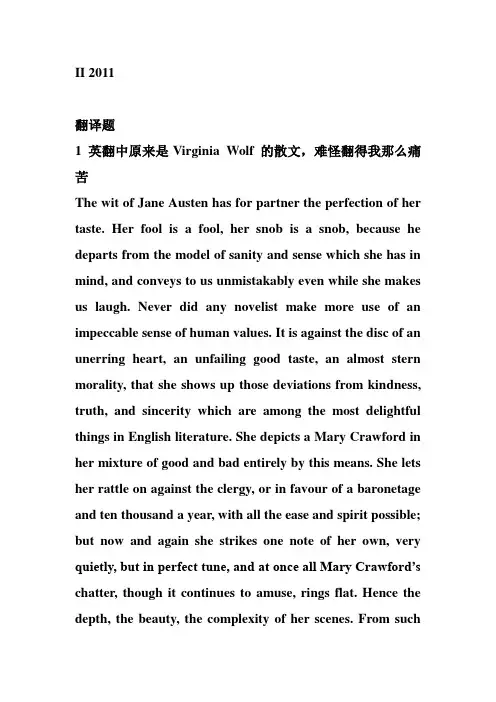
II 2011翻译题1 英翻中原来是Virginia Wolf 的散文,难怪翻得我那么痛苦The wit of Jane Austen has for partner the perfection of her taste. Her fool is a fool, her snob is a snob, because he departs from the model of sanity and sense which she has in mind, and conveys to us unmistakably even while she makes us laugh. Never did any novelist make more use of an impeccable sense of human values. It is against the disc of an unerring heart, an unfailing good taste, an almost stern morality, that she shows up those deviations from kindness, truth, and sincerity which are among the most delightful things in English literature. She depicts a Mary Crawford in her mixture of good and bad entirely by this means. She lets her rattle on against the clergy, or in favour of a baronetage and ten thousand a year, with all the ease and spirit possible; but now and again she strikes one note of her own, very quietly, but in perfect tune, and at once all Mary Crawford’s chatter, though it continues to amuse, rings flat. Hence the depth, the beauty, the complexity of her scenes. From suchcontrasts there comes a beauty, a solemnity even, which are not only as remarkable as her wit, but an inseparable part of it. In The Watsons she gives us a foretaste of this power; she makes us wonder why an ordinary act of kindness, as she describes it, becomes so full of meaning. In her masterpieces, the same gift is brought to perfection. Here is nothing out of the way; it is midday in Northamptonshire; a dull young man is talking to rather a weakly young woman on the stairs as they go up to dress for dinner, with housemaids passing. But, from triviality, from commonplace, their words become suddenly full of meaning, and the moment for both one of the most memorable in their lives. It fills itself; it shines; it glows; it hangs before us, deep, trembling, serene for a second; next, the housemaid passes, and this drop, in which all the happiness of life has collected, gently subsides again to become part of the ebb and flow of ordinary existence.What more natural, then, with this insight into their profundity, than that Jane Austen should have chosen to write of the trivialities of day-to-day existence, of parties, picnics, and country dances? No “suggestions to alter her style of writing” from the Prince Regent or Mr. Clarke could tempt her; no romance, no adventure, no politics or intriguecould hold a candle to life on a country-house staircase as she saw it. Indeed, the Prince Regent and his librarian had run their heads against a very formidable obstacle; they were trying to tamper with an incorruptible conscience, to disturb an infallible discretion. The child who formed her sentences so finely when she was fifteen never ceased to form them, and never wrote for the Prince Regent or his Librarian, but for the world at large. She knew exactly what her powers were, and what material they were fitted to deal with as material should be dealt with by a writer whose standard of finality was high简·奥斯丁的才智还以成熟的鉴赏力为它的亲密伙伴。
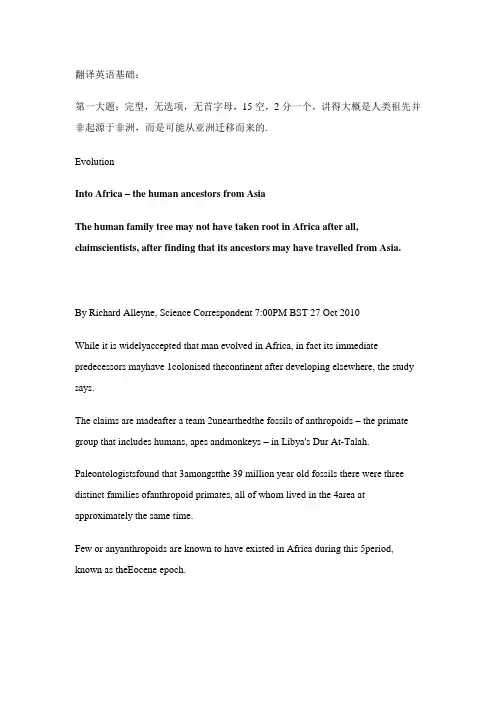
翻译英语基础:第一大题:完型,无选项,无首字母,15空,2分一个,讲得大概是人类祖先并非起源于非洲,而是可能从亚洲迁移而来的.EvolutionInto Africa – the human ancestors from AsiaThe human family tree may not have taken root in Africa after all, claimscientists, after finding that its ancestors may have travelled from Asia.By Richard Alleyne, Science Correspondent 7:00PM BST 27 Oct 2010While it is widelyaccepted that man evolved in Africa, in fact its immediate predecessors mayhave 1colonised thecontinent after developing elsewhere, the study says.The claims are madeafter a team 2unearthedthe fossils of anthropoids – the primate group that includes humans, apes andmonkeys – in Libya's Dur At-Talah.Paleontologistsfound that 3amongstthe 39 million year old fossils there were three distinct families ofanthropoid primates, all of whom lived in the 4area at approximately the same time.Few or anyanthropoids are known to have existed in Africa during this 5period, known as theEocene epoch.This could eithersuggest a huge gap in Africa's fossil record – 6unlikely, say the scientists, given the amount ofarchaeological work undertaken in the area –7 or that the species "colonised" Africafrom another continent at this time.As the evolutioninto three species would have 8taken extreme lengths of time, combined with the lack of fossilrecords in Africa, the team concludes that Asia was the most likely 9origin.Writing in thejournal Nature, the experts said they believed migration from Asia to be themost 10plausibletheory.Christopher Beard,of the Carnegie Museum of Natural History in Pittsburgh, said: "11If our ideas are correct,this early colonisation of Africa by anthropoids was a truly 12pivotal event — one ofthe key points in our evolutionary history."At the time,Africa was an island continent; when these 13anthropoids appeared, there was nothing on thatisland that could compete with them."It led to aperiod of flourishing evolutionary divergence amongst anthropoids, and one ofthose lineages 14resultedin humans."If our earlyanthropoid ancestors had not succeeded in migrating from Asia to Africa, wesimply 15wouldn'texist."He added:"This extraordinary new fossil site in Libya shows us that in the middleEocene, 39 million years ago, there was a surprising diversity of anthropoidsliving in Africa, whereas few if any anthropoids are known from Africa beforethis time."This suddenappearance of such diversity suggests that these anthropoids probably colonisedAfrica from somewhere else."Withoutearlier fossil evidence in Africa, we're currently looking to Asia as the placewhere these animals first evolved."第二大题:阅读。
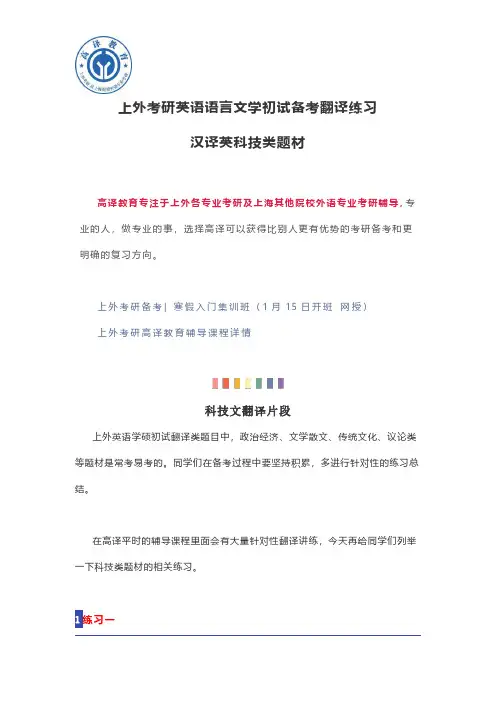
上外考研英语语言文学初试备考翻译练习汉译英科技类题材高译教育专注于上外各专业考研及上海其他院校外语专业考研辅导,专业的人,做专业的事,选择高译可以获得比别人更有优势的考研备考和更明确的复习方向。
上外考研备考|寒假入门集训班(1月15日开班网授)上外考研高译教育辅导课程详情科技文翻译片段上外英语学硕初试翻译类题目中,政治经济、文学散文、传统文化、议论类等题材是常考易考的。
同学们在备考过程中要坚持积累,多进行针对性的练习总结。
在高译平时的辅导课程里面会有大量针对性翻译讲练,今天再给同学们列举一下科技类题材的相关练习。
1练习一晚上临睡前,你可能会给手机充上电,想着第二天早上看到一部电量满格的手机。
这是个好主意吗?不一定。
问题在于,很多人并不想使用寿命超过两年时间的手机。
Chances are,you plug in your phone before you go to bed at night,thinking it's best to greet the morning with a fully charged device. Is this a good idea?That depends.Here's the thing.Many people don't expect to keep their phones for much longer than two years.2练习二专家称,大多数情况下,这些人在渴望换新手机之前,并不会注意到现有手机电池的受损程度。
如果你也是这样,那你可以每天晚上都充电,想充几次就充几次。
但频繁充电会损害手机锂离子电池的性能。
For the most part,experts say,those people are not going to notice much damage to their phone batteries before they start hankering for a new device.If that sounds like you,feel free to charge every night,and as often as you like in between.But frequent charging takes a toll on the lithium-ion batteries in our phones.3练习三Anker公司的发言人埃多·坎波斯表示,原因并不在于电池不能过度充电。

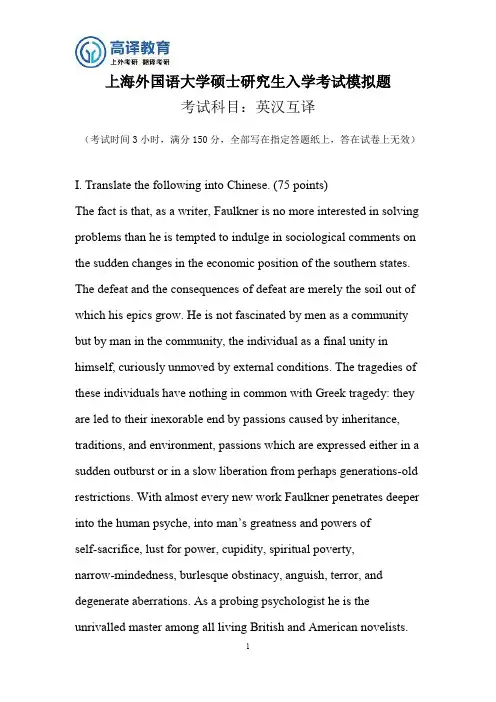
上海外国语大学硕士研究生入学考试模拟题考试科目:英汉互译(考试时间3小时,满分150分,全部写在指定答题纸上,答在试卷上无效)I. Translate the following into Chinese. (75 points)The fact is that, as a writer, Faulkner is no more interested in solving problems than he is tempted to indulge in sociological comments on the sudden changes in the economic position of the southern states. The defeat and the consequences of defeat are merely the soil out of which his epics grow. He is not fascinated by men as a community but by man in the community, the individual as a final unity in himself, curiously unmoved by external conditions. The tragedies of these individuals have nothing in common with Greek tragedy: they are led to their inexorable end by passions caused by inheritance, traditions, and environment, passions which are expressed either in a sudden outburst or in a slow liberation from perhaps generations-old restrictions. With almost every new work Faulkner penetrates deeper into the human psyche, into man’s greatness and powers ofself-sacrifice, lust for power, cupidity, spiritual poverty,narrow-mindedness, burlesque obstinacy, anguish, terror, and degenerate aberrations. As a probing psychologist he is the unrivalled master among all living British and American novelists.Neither do any of his colleagues possess his fantastic imaginative powers and his ability to create characters. His subhuman and superhuman figures, tragic or comic in a macabre way, emerge from his mind with a reality that few existing people - even those nearest to us - can give us, and they move in a milieu whose odours of subtropical plants, ladies’ perfumes, Negro sweat, and the smell of horses and mules penetrate immediately even into a Scandinavian’s warm and cozy den. As a painter of landscapes he has the hunter’s intimate knowledge of his own hunting ground, the topographer’s accuracy, and the impressionist’s sensitivity.Moreover—side-by-side with Joyce and perhaps even more so—Faulkner is the great experimentalist among twentieth-century novelists. Scarcely two of his novels are similar technically. It seems as if by this continuous renewal he wanted to achieve the increased breadth which his limited world, both in geography and in subject matter, cannot give him.II. Translate the following into English. (75 points)隐逸的生活似乎在传统意识中一直被认为是幸福的至高境界。
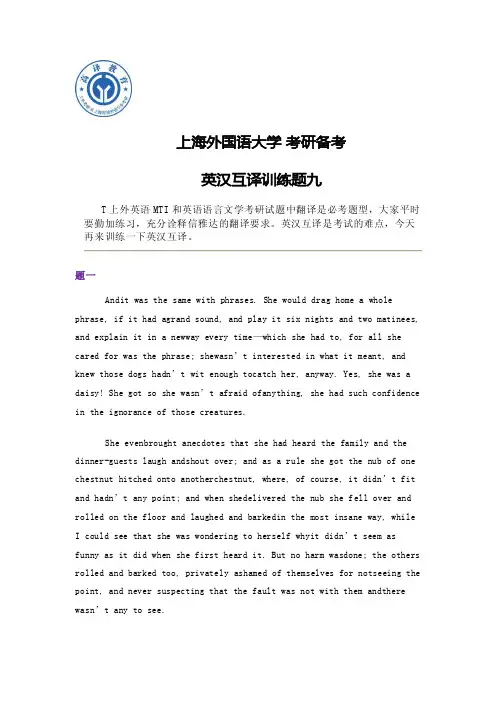
上海外国语大学考研备考英汉互译训练题九T上外英语MTI和英语语言文学考研试题中翻译是必考题型,大家平时要勤加练习,充分诠释信雅达的翻译要求。
英汉互译是考试的难点,今天再来训练一下英汉互译。
题一Andit was the same with phrases. She would drag home a whole phrase, if it had agrand sound, and play it six nights and two matinees, and explain it in a newway every time—which she had to, for all shec ared for was the phrase; shewasn’t interested in what it meant, and knew those dogs hadn’t wit enough tocatch her, anyway. Yes, she was a daisy! She got so she wasn’t afraid ofanything, she had such confidence in the ignorance of those creatures.She evenbrought anecdotes that she had heard the family and the dinner-guests laugh andshout over; and as a rule she got the nub of one chestnut hitched onto anotherchestnut, where, of course, it didn’t fit and hadn’t any point; and when shedelivered the nub she f ell over and rolled on the floor and laughed and barkedin the most insane way, while I could see that she was wondering to herself whyit didn’t seem as funny as it did when she first heard it. But no harm wasdone; the others rolled and barked too, privately ashamed of themselves for notseeing the point, and never suspecting that the fault was not with them andthere wasn’t any to see.翻译:对于短语也是这样。
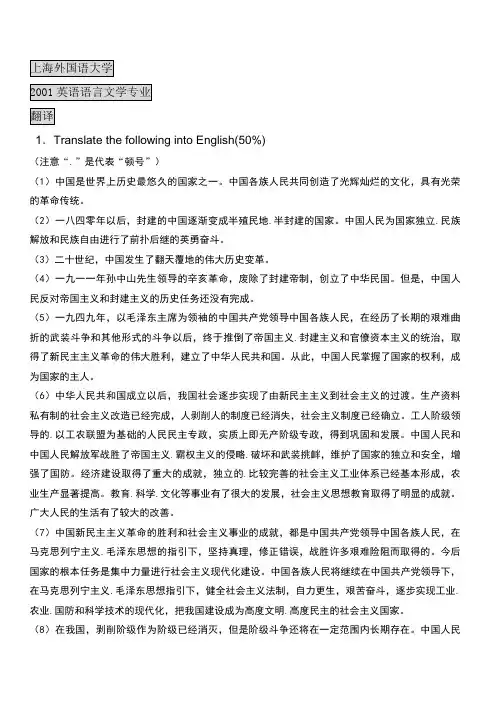
1.Translate the following into English(50%)(注意“.”是代表“顿号”)(1)中国是世界上历史最悠久的国家之一。
中国各族人民共同创造了光辉灿烂的文化,具有光荣的革命传统。
(2)一八四零年以后,封建的中国逐渐变成半殖民地.半封建的国家。
中国人民为国家独立.民族解放和民族自由进行了前扑后继的英勇奋斗。
(3)二十世纪,中国发生了翻天覆地的伟大历史变革。
(4)一九一一年孙中山先生领导的辛亥革命,废除了封建帝制,创立了中华民国。
但是,中国人民反对帝国主义和封建主义的历史任务还没有完成。
(5)一九四九年,以毛泽东主席为领袖的中国共产党领导中国各族人民,在经历了长期的艰难曲折的武装斗争和其他形式的斗争以后,终于推倒了帝国主义.封建主义和官僚资本主义的统治,取得了新民主主义革命的伟大胜利,建立了中华人民共和国。
从此,中国人民掌握了国家的权利,成为国家的主人。
(6)中华人民共和国成立以后,我国社会逐步实现了由新民主主义到社会主义的过渡。
生产资料私有制的社会主义改造已经完成,人剥削人的制度已经消失,社会主义制度已经确立。
工人阶级领导的.以工农联盟为基础的人民民主专政,实质上即无产阶级专政,得到巩固和发展。
中国人民和中国人民解放军战胜了帝国主义.霸权主义的侵略.破坏和武装挑衅,维护了国家的独立和安全,增强了国防。
经济建设取得了重大的成就,独立的.比较完善的社会主义工业体系已经基本形成,农业生产显著提高。
教育.科学.文化等事业有了很大的发展,社会主义思想教育取得了明显的成就。
广大人民的生活有了较大的改善。
(7)中国新民主主义革命的胜利和社会主义事业的成就,都是中国共产党领导中国各族人民,在马克思列宁主义.毛泽东思想的指引下,坚持真理,修正错误,战胜许多艰难险阻而取得的。
今后国家的根本任务是集中力量进行社会主义现代化建设。
中国各族人民将继续在中国共产党领导下,在马克思列宁主义.毛泽东思想指引下,健全社会主义法制,自力更生,艰苦奋斗,逐步实现工业.农业.国防和科学技术的现代化,把我国建设成为高度文明.高度民主的社会主义国家。
上海外国语大学1991年攻读硕士学位研究生考试试卷考试科目:翻译与现代汉语I. Translate the following passage into Chinese.(25%)Thus far, our holiday has been simply a friendly sign of the survival of the love of letters amongst a people too busy to give to letters any more. As such it is precious as the sign of an indestructible instinct. Perhaps the time is already come when it ought to be, and will be, something else; when the sluggard intellect of this continent will look from under its iron lids and fill the postponed expectation of the world with something better than the exertions of mechanical skill. Our day of dependence, our long apprenticeship to the learning of other lands, draws to a close. The millions that around us are rushing into life, cannot always be fed on the mere remains of foreign harvests. Events, actions arise, that must be sung, that will sing themselves. Who can doubt that poetry will revive lead in a new age, as the star in the constellation Harp, which now flames in our zenith, astronomers announce, shall one day be the polestar for a thousand years?(Excerpted from The American Scholar by R.W. Emerson)II. Translate the following passage into English.(25%)海风微微的吹过岛上,白日里剩下的热气全吹走了。
上海外国语大学英语语言文学考研中译英翻译练习英语试题中,翻译的题材政治、经济、文化等主题都可能会涉及。
今天再给筒子们分享几个中译英考研专项训练题,尝试做一下,感受一下题目的特点,平时也多做训练,加强应试能力。
练习一我写小说的道路张恨水我在十一二岁,看小说已经成迷了,十四五岁我就拿起笔来,仿照七侠五义的套子,构成一个十三岁的孩子,会玩大铁锤[1]。
这小说叫什么名字,现在记不得了,可是这里面我还画成了画,画一个小侠客,拿着两柄大锤,舞成了旋风舞[2]。
我为什么这样爱作小说,还要画侠客图呢?因为我的弟妹以及小舅父,喜欢听我说小侠客故事,有时我把图摊开来,他们也哈哈大笑。
至今我想起来,何以弄小说连图都画上了。
说我求名吗?除了家里三四个听客,于外没有人知道,当然不是。
说我求利吗?大人真个知道了,那真会笑掉了大牙。
当然也不是。
我就喜欢这样玩意,喜欢,我就高兴乱涂。
什么我也不求。
How I Started My Career as a NovelistZhang HenshuiI became engrossed in reading fiction when I was12.At15,I wrote a story patterned after Seven Swordsmen and Five Gallants[1].I did it like I was a small kid having the audacity to wield a heavy iron hammer.I have forgotten the title of the story,but,I remember,it was illustrated with my drawing of a hero dancing around like mad wielding a pair of giant maces.I enjoyed writing stories illustrated with my drawings of gallants because my younger brothers and sisters plus my young uncle all liked to listen to my storytelling.And they would be greatly amused when I sometimes showed them the illustrations.Did I seek fame?Of course not,for I had no other listeners except a handful of my own folks.Did I seek personal gain?No,not either, for that would have made a laughing stock of myself in the family.I did it for love. That's all there is to it.练习二我到十五六岁,小说读的更多了。
上海外国语大学2022年硕士研究生入学考试试题考试科目:357英语翻译基础专业:翻译说明:所有答案必须写在答题纸上,做在试题或草稿纸上无效一、汉译英(80分)用“双增”推动“双减”落实今天,上海市教委就“强化学校教育主阵地作用”召开新闻发布会称,上海方面已注意到“双减”工作既要治标、又要治本的要求,未来将尝试通过用“双增”来推动“双减”的具体落实。
“把课外内容减了,我们要把课内做强做好。
”上海市教委相关负责人表示,上海将把“增强学校主阵地功能、增强校内教育质量”作为落实“双减”工作的主要内容,其中包括加强学校作业管理、全面实施义务教育课后服务、建立培育课后服务支持体系、加快推进紧密型学区集团建设、推进落实全员导师制全覆盖6个方面内容。
“这是首次明确把课后服务延伸到初中学段。
参加课后服务将成为学生常态,大多数人都参加。
”上海市教委相关负责人介绍,与课后服务时长配套的,是对学校布置高质量作业的新要求。
上海市教委相关负责人员说,高质量作业要求“小学作业不出校门,初中疑难作业不带回家”。
为此,上海还将要求义务教育阶段各所学校建立作业公示制度,公示作业完成时间和内容。
“校长和老师们要思考,如何向40分钟的课堂要质量。
而不是反复操练,捆绑出来的好成绩没有用。
”上海市教委相关负责人员介绍,考核的是80%学生的作业时长,不算平均数,作业管理将被纳入学校绩效考核范围。
上海市教委相关负责人介绍,上海“双减”工作的一个重要导向是关注每个学生,包括学生的情绪疏导、未来发展、生命价值讨论等。
“强调系统性、整体性、针对性地推进‘双减’工作,治标的同时要从治本上下工夫”。
二、英译汉(70分)The Reader,the Text,the PoemThe views set forth here have been tested and tempered by over forty years of observing and reflecting on readers'involvements with texts ranging from Chaucer and Shakespeare to Joyce and Wallace Stevens.For two decades,in a course on"Criticism and the Literary Experience,"I was able to pursue the study systematically.I presented texts-many of them repeated year after year to graduateand undergraduate students,who were often helped to develop a measure of self-criticism before their study of the critical canon from Plato to Eliot and beyond.A by-product for me was the opportunity,through various techniques,to gather evidence of what went onduring their reading.I was able to discover continuities and differences in response with changing student populations and changing mores,and to analyze the processes and patterns that manifested themselves in the actual movement toward an interpretation.My aim was to immerse myself in a rich source of insights,not merely to accumulate a body of codified data.What follows,therefore,is a distillation of my observations,reflections,and reading.As contemporary philosophers remind us,the observer inevitably enters into his observations:although I stress the inductive groundwork,obviously I brought to these inquiries various assumptions and hypotheses to be either supported or discarded.Further,strict training in the historical and critical disciplines of literary scholarship had established in me habits of thought from some of which I needed to be liberated.Perhaps this book can perform a similar service for others,not merely by articulating a particular set of intellectual theses but by inducing a new way of thinking about literary works of art.With one exception already alluded to,I have avoided the current tendency to create new terminology.Citations also have been kept to a minimum;a list of the works consulted over the years,or even those to which I am in some way indebted,beyond the ones mentioned in the notes,would be excessively long.I shall try simply to suggest the intellectual matrix within which the transactional theory of the literary work has evolved.As I look back on a long scholarly career,I become aware of a continuing need to affirm and to reconcile two often opposed positions,phrased,in earliest terms,as a Keatsian sense of the unique values of art,on the one hand,and,on the other,a Shelleyan feeling for its social origins and social impact.My first book,(L'Idée de l'art pour l'art dans la littérature anglaise (Paris,1931),)written for the doctorate in comparative literature at the Sorbonne,was a study of the theories of art for art's sake developed by nineteenth-century English and French writers to combat the pressures of an uncomprehending or hostile society.In the concluding pages,I stated the need for a public of readers able"to participate fully in the poetic experience" -readers able to provide a nurturing,free environment for poets and other artists of the word.Their texts possess,I believed,the highest potentialities for bringing the whole human personality,as Coleridge had said,"into activity."Here already was the germ of an increasingly intense preoccupation with the importance,to the arts and to society,of the education of readers of literature.My second book,(Literature as Exploration(1938),)confronted this problem directly,setting forth a philosophy of the teaching of literature the outgrowth mainly of my experience in teaching English and comparativeliterature at Barnard College.The book also refleeted work with Franz Boas and Ruth Benedict in the graduate department of anthropology at Columbia University.By that time,the writings of William Tamea.C.S.Peirce.Genroe Santavana,and John Dewey had provided a philosophic base for reconciling my aesthetic and social commitments.Dewey's Arl as Experience especially left its mark,perhaps more through its vision of aesthetic values woven into the texture of the daily life of human beings than its specific treatment of the literary arts.。
上海外国语大学翻硕英汉互译真题上海外国语大学翻译基础科目英汉互译真题MDGS Mille nn ium Developme nt Goals 千禧年发展计划Ban Ki-moon 潘基文国务卿Secretary of State雷曼兄弟(Lehman Brothers)次贷危机sub-prime crisis西部大开发战略strategy of wester n developme ntCAD:计算机辅助设施red star over china :《西行漫记》个体工商户:private bus in ess鸦片战争:First Opium War民革:Revolutio nary Committee of the Ch in ese Kuomi ntang 即中国国名党革命委员会民盟:China Democratic League限价房:limited price社会保障体系:Social Security System国计委:state planning conmmissionNASA:美国国家航空航天局FBI :美国联邦调查局UNESCO:联合国科教文组织CCTV:中国中央电视台IAEA:国际原子能机构FDI:外商直接投资Diet of Japan:国会The Tories:托利党王党保守党The Treasure Department of the U.S :美国财政部The State Department in the Washington:华盛顿美国国务院Bala nee of Payme nts:国际收支平衡港人治港:Hong Kong Self-rule Hong Kong people gover n Hong Kong全面建设小康社会:to build a moderately prosperous society in all aspects中国特色社会主义:socialism with Chin ese characteristic构建两岸关系和平发展的框架:Con struct ing peaceful developme nt of cross-straits relati ons framework知足常乐:content is happ in ess水火无情:Fire and water have no mercy一蹶不振:cannot recover after a setbackGenetic mutation:基因突变International Herald Tribune:《国际先驱论坛报》一次性筷子:on e-off chopsticks按揭贷款:mortgage loa nIATA: 国际航空运输协会IPR:知识产权UNICEF: 联合国国际儿童基金bon ded warehouse:保税仓Binary theory:二进制理论温室气体:gree nhouse gases转基因食物:GM FOODAPEC:亚太经合组织售后服务:after-sale servicede facto:实际制艾滋病毒:AIDS virus应用语言学:applied lin guisticCBS:哥伦比亚广播公司dyn amic equivale nee:动态对等法P ostScript :附言transliteration :直译overtranslation :超额翻译black sheep:害群之马outsource :外包山寨手机:copycat cellph ones破釜沉舟:cut off all means of retreat以牙还牙:return like for like对冲基金:Hedge fund本末倒置:put the in cide ntal before the fun dame ntalGDP:国内生产总值BBS:电子布告栏WHO :世界卫生组织LCD :液晶显示屏LC : 登陆艇(Ian di ng craft)NGO:非政府组织、民间组织CPPCC:中国人民政治协商会议ASEM ;亚欧会议China- ASEAN Expo ;中国东盟展览会SWOT analysis:四点分析(优势劣势机会威胁) Global Sourcing:全球采购In formati on Asymmetry : 信息不对称Innocent Presumption : 无罪推定The Book of Rites :《礼记》Mencius:孟子Con secutive In terpret ing:接续口译The House of Commons: 下议院A farewell to arms 《永别了武器》全国人民代表大会:National People ' s Congress夕卜交咅B ; Ministry of Foreign affairs会展会计:exhibiti on economy注册会计师:CPA( Certified Public Accou ntant)董事会:board of directors中国证监会;CSRC Ch ina Security Regulatory Commissi on )廉政公署:ICAC( In depe ndent Commissi on Aga inst Corruptio n)暂行推定:temporary provisi ons有罪推定;guilty presumption佛经翻译:the translation of Buddhist scriptures百年老店:cen tury-old shop论语:the An alects三国演义:Roma nee of Three Kin gdoms / Three Kin gdoms南方都市报:South City News台湾当局:TaiWa n authorities台独:Tai Wan In depe ndence台湾同胞;Tai Wan compatriots反分裂国家法 : the an ti-secessi on law一国两制:One country two systemsCIS countries:独联体国家中美联合公报:Si no-US Joi nt Commu nique commuter :通勤者上班乘车者USNE :美棉北欧到岸价TAO :道教CDED :欧洲裁军会议( conference on disarmament in Europe)。
上海外国语大学《641翻译实践》英汉互译考研真题上海外国语大学《641翻译实践》英汉互译考研真题一、上海外国语大学高级翻译学院841翻译实践(英汉互译)考研真题及详解I. Translate the following into Chinese(75分)The Short MarchBy BILL POWELL/SHANGHAI Thursday, Feb. 14, 2008 Locals sell produce outside the gates of one of Songjiang’s new developmentsOn a cold, gray afternoon a year ago, I stood on the deck of our newly purchased, half-constructed house about an hour outside Shanghai, wondering what, exactly, I had gotten myself into. My wife, a Shanghai native, and I had moved back to China from New York City in the spring of 2004, and 21/2 years later we had decided to take the plunge. We bought a three-story, five-bedroom townhouse way out in the suburbs, in a town called New Songjiang, a place that was then—and remains now —very much a work in progress.We had come here that day to see how construction was progressing. Our house, along with about 140 others, was going up in a development called Emerald Riverside. It sits on the banks of a tributary that dumps into the Huangpu, the river that cuts Shanghai in two about 28 miles (45km) to the northeast. On that dreary afternoon I gazed out to the other side of the river, looking at the only significant patch of land for miles that was not yet being developed—about five acres (20,000 sq. m) of green that local farmers still used to grow watermelons, which they then sold to the migrant workersbuilding this town. On the far bank there was a ramshackle one-room brick house, where three of the farmers lived—a husband, wife and teenage son. They had no running water—they bathed and washed their clothes in the river—and the place was lit by a single bulb. In every direction just beyond the watermelon patch, office parks and houses and apartment complexes were going up, forming a cordon around the farmland that was drawing inexorably tighter. As it is in vast swathes of China, the new was replacing the old, and it was not doing so slowly. It was doing so in the blink of an eye.I stood on the deck that day and watched one of the farmers who worked the watermelon patch, an older woman who would later introduce herself to us as Liu Yi, as she stared back at me across the river.I remember thinking to myself, My god, what must be going through her mind? Not only is the land she works on about to disappear, but there’s this foreigner standing over there staring at her. Where did he come from and, more to the point, what in the world is he doing out here? The short answer is that my wife and I have become a tiny part of China’s latest revolution. We got an off-the-shelf mortgage from the StandardChartered Bank branch in town, plunked down 25% of the purchase price, and bought ourselves a piece of the Great Chinese Dream.Best Years of Their LivesFor the past decade and a half, the frantic pace of urbanization has been the transformative engine driving this country’s economy, as some 300-400 million people from dirt-poor farming regions made their way to relative prosperity in cities. Within the contours of that great migration, however, thereis another one now about to take place—less visible, but arguably no less powerful. As China’s major cities—there are now 49 with populations of one million or more, compared with nine in the U.S. in 2000—become more crowded and more expensive, a phenomenon similar to the one that reshaped the U.S. in the aftermath of World War II has begun to take hold. That is the inevitable desire among a rapidly expanding middle class for a little bit more room to live, at a reasonable price; maybe a little patch of grass for children to play on, or a whiff of cleaner air as the country’s cities become ever more polluted.This is China’s Short March. A wave of those who are newly affluent and firm in the belief that their best days, economically speaking, are ahead of them, is headed for the suburbs. In Shanghai alone, urban planners believe some 5 million people will move to what are called “satellite cities”in the next 10 years. To varying degrees, the same thing ishappening all across China. This process—China’s own suburban flight —is at the core of the next phase of this country’s development, and will be for years to come.The consequences of this suburbanization are enormous. Think of how the U.S. was transformed, economically and socially, in the years after World War II, when GIs returned home and formed families that then fanned out to the suburbs. The comparison is not exact, of course, but it’s compelling enough. The effects of China’s suburbanization are just beginning to ripple across Chinese society and the global economy. It’s easy to understand the persistent strength in commodity prices—steel, copper, lumber, oil—when you realize that in Emerald Riverside construction crews used more than three tons of steel in the houses and nearly a quarter of a ton of copper wiring.There are 35 housing developments either just finished or still under construction in New Songjiang alone, a town in which 500,000 people will eventually live. And as Lu Hongjiang, a vice president of the New Songjiang Development & Construction company puts it, “we’re only at the very beginning of this in China.”【参考译文】短行军比尔·鲍威尔,星期四,2008年2月14日当地人在新淞江发展区门外卖农产品一年前的一个寒冷阴暗的下午,我站在我们距离上海市区一小时车程的尚在建设中的新房的地板上,陷入了沉思,我的妻子是上海本地人,我在2004年春天离开纽约来到中国,两年半以后我们做了这个决定。
05年:Human Greatness.汉译英参考译文Confucius says, “Out of three men, there must be one that can teach me.” So pupils are not necessarily inferior to their teachers, nor teachers better than their pupils. Some learn the truth earlier than others, and some have special skills—that is all.”孔子曾经说过“三人行,必有我师焉。
”因此学生并不一定就低老师一等,老师也不见得就一定比学生优秀。
只不过有的人比别人更早地明白真理,有的人拥有特殊技能罢了。
A similar idea is expressed by the following well-known passage quoted from Xueji (The Subject of Education), a chapter of the ancient book Liji (The Book of Rites): 在《学记》和《礼记》的著名段落中我们也能找到类似的思想。
“食美与否,不吃不知其味也;理善与否,不学不知其真也”“However nice the food may be, if one does not eat it, he does not know its taste. however perfect the doctrine may be, if one does not learn it, he does not know its value. 因此,其学者知其不足,其教授者只其难也。
Therefore, when he learns, one knows his own deficiencies. when he teaches, one knows where the difficulty lies. 知不足,则学者省自身;知其难,则教授者得进取。
After he knows his deficiencies, one is able to examine himself. after he knows where the difficulty li es, one is able to improve himself. Hence, …teaching and learning help each other.‟ as it is said in Yue Ming,…Teaching is the half of learning.‟” The above quote from Liji, which lays emphasis on self-examination and self-improvement, is less thoroughgoing than what Han Yu says about education. Nevertheless, its remarks such as "When he teaches one knows where the difficulty lies,” “Teaching benefits teachers as well as pupils” and “Teaching is the half of learning” (a quotation meaning teaching and learni ng are opposite and complementary to each other) all remain irrefutable to this day.The new relationship between teacher and pupil should be that of, in the words of Han Yu,“not (being) ashamed to learn from each other.” That is within the mind. It affects the soul directly. but it can affect it also by obscure and circuitous ways - through the blood. Half the human race lives in manifest obedience to the lunar rhythm. and there is evidence to show that the physiological and therefore the spiritual life, not only of women, but of men too, mysteriously ebbs and flows with the changes of the moon. There are unreasoned joys, inexplicable miseries, laughters and remorses without a cause. Their sudden and fantastic alternations constitute the ordinary weather of our minds. These moods, are the children of the blood and humours. But the blood and humours obey, among many other masters, the changing moon. Touching the soul directly through the eyes and, indirectly, along the dark channels of the blood, the moon is doubly a divinity.Even if we think of the moon as only a stone, we shall find its very stoniness potentially a numen. A stone gone cold. An airless, waterless stone and the prophetic image of our own earth when, some few million years from now, the senescent sun shall have lost its present fostering power.... And so on. This passage could easily be prolonged-a Study in Purple. But I forbear. Let every reader lay on as much of the royal rhetorical colour as he finds to his taste. Anyhow, purple or no purple, there the stone is-stony. You cannot think about it for long without finding, yourself invaded by one or other of several essentially numinous sentiments. These sentiments belong to one or other of two contrasted and complementary groups Sentiments of Human Insignificance Sentiments of Confucius says, “Out of three men, there must be one that can teach me.” So pupils are not necessarily inferior to their teachers, nor teachers better than their pupils. Some learn thetruth earlier than others, and some have special skills—that is all.”A similar idea is expressed by the following well-known passage quoted from Xueji (The Subject of Education), a chapter of the ancient book Liji (The Book of Rites): “However nice the food may be, if one does not eat it, he does not know its taste. however perfect the doctrine may be, if one does not learn it, he does not know its value. Therefore, when he learns, one knows his own deficiencies. when he teaches, one knows where the difficulty lies. After he knows his deficiencies, one is able to examine himself. after he knows where the difficulty lies, one is able to improve himself. Hence, …teaching and learning help each other.‟ as it is said in Yue Ming,…Teaching is the half of learning.‟” The above quote from Liji, which lays emphasis on self-examination and self-improvement, is less thoroughgoing than what Han Y u says about education. Nevertheless, its remarks such as "When he teaches one knows where the difficulty lies,” “Teaching benefits teachers as well as pupils” and “Teaching is the half of learning” (a quotation meaning teaching and learning are opposite and complementary to each other) all remain irrefutable to this day.The new relationship between teacher and pupil should be that of, in the words of Han Yu,“not (being) ashamed to learn from each other.” That is to say, teacher and pupil should teach each other and learn from each other. They should teach each other as equals regardless of seniority, so that, as Han Y u says, “whoever knows the truth can be a teacher.”英译汉参考译文在我的窗外,夜正在挣扎着醒过来;在月光下黯然无色的花园如此生动地梦见它那失去的色彩。